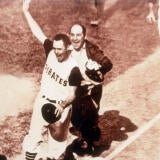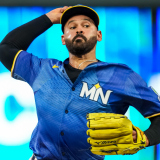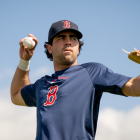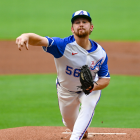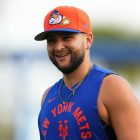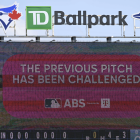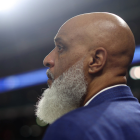MLB trade deadline: Brad Hand and Jeurys Familia aren't the only relievers worth pursuing
Surveying the bullpen market ahead of the July 31 trade deadline
Now that it's July, it's time to start thinking about Major League Baseball's trade deadline. Per usual, teams have until July 31 at p.m. ET to make deals without needing to resort to waivers.
As part of our deadline coverage, we'll be previewing the market in a variety of ways -- that includes a positional overview. We've already covered the infield, outfield and starting pitching markets. That leaves us with the potentially available relievers. (Note: the relievers are separated by contract status, then organized alphabetically.)
Controllable deals
As we explained earlier this week, the Marlins have a few compelling relievers who could interest contenders looking for multi-year fixes. Kyle Barraclough is the best of the Miami bunch thanks to a deceptively short arm action that enhances his mid-90s fastball and pair of swing-and-miss offerings. He's in the midst of a career-best season from an ERA (0.99) and strikeout-to-walk ratio (2.29) perspective, and he's done well to slice into his walk rate (though he's still issuing about one free pass every other inning). With three seasons of team control remaining, he could slot in as a team's seventh- or eighth-inning guy for the foreseeable future.
Brad Hand isn't having quite as good of a season as he did in 2017, when he was a popular name at the trade deadline, but he's nonetheless sporting a 127 ERA+ and a strikeout-to-walk ratio nearing 3.90. He's since signed an extension with the Padres that will pay him more than $14 million over the next two seasons and contains a club option worth another $10 million for the 2021 season. He's turned into a slider-first pitcher this season, and it's hard to argue with that shift -- batters are hitting .162 against the pitch and have whiffed on nearly 40 percent of their swings. The Padres could hang onto Hand, but if not he'll bring back a haul.
Raisel Iglesias doesn't get the same attention as Hand, but he's been dominant in his year-plus since assuming the closer role in Cincinnati (2.36 ERA; 3.33 strikeouts per walk). Because he has three years remaining of team control, the Reds could justify holding onto him. At the same time, Iglesias has a history of health concerns and his value may never be higher. Perhaps the Reds wait until the winter to make a move. It wouldn't hurt to test their conviction though.
The youngest pitcher on this list, Keone Kela is just 25 years old and in his first season as Rangers closer. Given how Texas is in rebuild mode, they could make him available in order to recoup as much prospect surplus as possible. Kela, for his part, has a power arsenal led by an upper-90s fastball and a breaking ball that has generated whiffs on 45 percent of the swings taken against it. Depending on when the Rangers intend to compete again, they could elect to keep him for themselves barring a Godfather-style offer.
Seung-Hwan Oh changed birds and leagues over the winter, hopping from the Cardinals to the Blue Jays, and has returned to being an effective reliever. Unlike most of late-inning arms, he doesn't throw hard, instead getting outs by commanding his rising low-90s fastball. Oh is prone to home runs, however, and that could cause other teams to pause before throwing him into the seventh or eighth innings. Nonetheless, someone will employ him next season, and for a pittance -- his $2.5 million club option will vest with 70 appearances.
Yes, Joakim Soria remains a quality relief arm. Though he's pitched on a brutal White Sox team all season, he's managed a 152 ERA+ and 5.50 strikeout-to-walk ratio. Soria refuses to walk batters and doesn't give up many home runs. That's a winning combination in general. Add in how his fleshy arsenal continues to miss bats, and how he has experience as a setup man and closer, and it's a given he'll find himself on a new team come August 1. The only question is whether or not Soria's acquiring team will exercise his $10 million club option for next season.
For years, Craig Stammen was a rubber-armed righty for the Nationals. Injuries derailed his career, all but eliminating the 2015-16 seasons for him. But he bounced back last season with the Padres, and has pitched like a legitimate late-inning stud in 2018. Stammen has a strikeout rate over 10 per nine and a walk rate under two per nine. He's permitted just one home run over his first 38 innings, and that's allowed him to keep his ERA shiny, at 2.58. He still lives and dies with his low-90s sinker, yet his slider has generated whiffs on nearly half the swings taken on it. Durability will remain a question for Stammen's body to answer heading forward, but the Padres look smart in locking him up through the 2019 season at the cost of $2.25 million.
Drew Steckenrider doesn't receive the same acclaim as his teammate Barraclough does. But he's posted a 2.82 ERA in more than 75 career outings thanks to a lively mid-90s fastball and a cutter that enables him to pitch to both sides of the plate. Steckenrider won't be a free agent until after the 2023 season. As such, Miami can be as picky as they want in moving the 27-year-old.
Think of Kirby Yates as this year's Blake Parker. Last season, the Angels opted against moving Parker, who was having a career season. Will the Padres choose differently with Yates? He's pitched wonderfully, amassing a 0.79 ERA and striking out about 11 batters per nine. But he's also 31 years old and has a history of injuries and shaky performances. Other teams are well aware of those facts, and may not be willing to give the Padres what they'd want in return.
Rentals
For as good as Brad Brach has been during his Orioles career, there are a number of red flags that could diminish the return Baltimore receives. His velocity has dipped more than a mile per hour versus last season, and his walk rate has jumped from 3.4 per nine to 4.7. Sometimes a change of scenery makes sense. With Brach, you worry there's something wrong with him -- and that whatever that something is will be making the trip with him when he's dealt.
The Orioles' other walk-year reliever, Zach Britton missed the few first months of the year recovering from an Achilles injury. The early returns haven't been pretty. Britton's sinker is clocking in around 94 mph, down two ticks from last year and three from 2016, and he's struggled to locate the strike zone on a consistent basis. The hope is that he shakes off the rust from the layoff, but without the turbo sinker he's unlikely to be the same pitcher he once was.
Similar to Oh, the Blue Jays gambled on Tyler Clippard rebounding from a wicked home-run rate. The gamble has paid off -- sort of. Clippard has a pretty ERA (3.20), but his home-run rate has increased, from 1.5 to 1.6 per nine. Clippard is walking fewer batters and allowing slightly fewer hits, yet it's fair to say his performance feels more like a mirage than not.
The Rangers may not move Kela, but seem certain to find a taker for Jake Diekman. For those not familiar with Diekman, all you need to know is he's a live-arm lefty with a sinker-slider combination who has been effective against righties and lefties alike in recent years. He is wild, and that's a negative, but his groundball tendencies help cover for that blemish.
One of the bigger names likely to be available, Jeurys Familia hasn't pitched like his old self over the last year-plus. To wit, he's sporting a 104 ERA+ and 2.21 strikeout-to-walk ratio (with a walk every other inning) since his All-Star 2016. That he's remained stingy with the long ball is a credit to Familia, but interested parties should be aware they aren't getting him at his best.
David Hernandez continues to bounce around the league, posting solid numbers and getting little respect. This year he's toiled with the Reds, accumulating a 1.57 ERA and 2.58 strikeout-to-walk ratio. Hernandez still does his work with a mid-90s fastball and curveball, and any number of contenders could plug him in as a middle reliever.
Similar to Hernandez, all Jared Hughes does is get outs. He doesn't miss bats, relying instead on missing barrels with his sinker. His results (a career 2.69 ERA in 400-plus appearances) have always been better than his treatment. His affinity for generating double-play balls (19 percent for his career and 22 percent the past three seasons) would make him a good fit as a situational arm.
Using Brad Ziegler as a closer or full-inning reliever at this point in his career is a mistake. Using him as a situational reliever who can outfunk righties? That makes sense and should be his role if and when he latches on with a new team. Ziegler has more than $4 million remaining on his tab, so the Marlins might have to eat some of that or just give him away to find a taker.






























